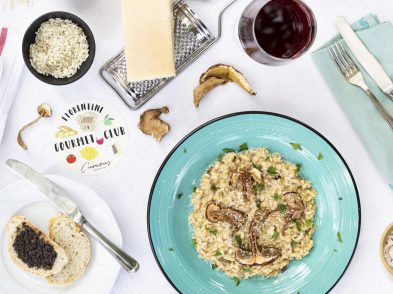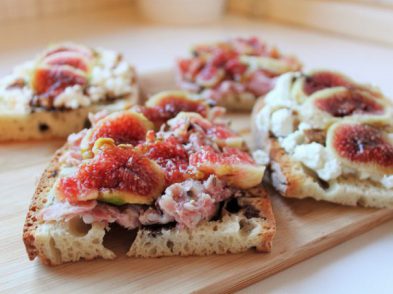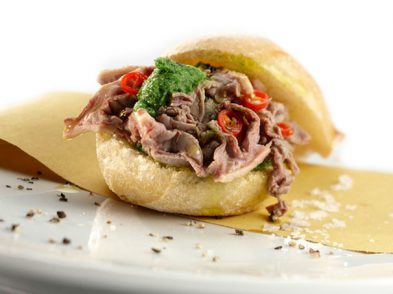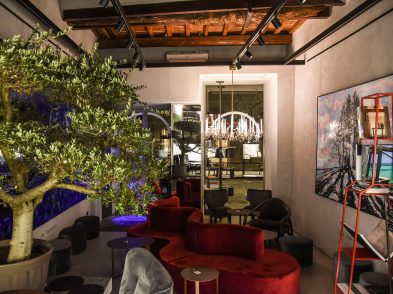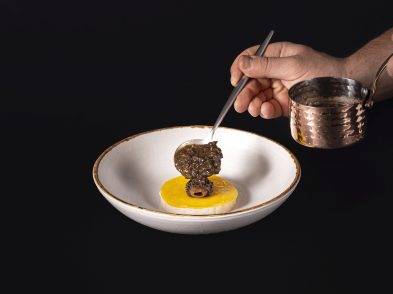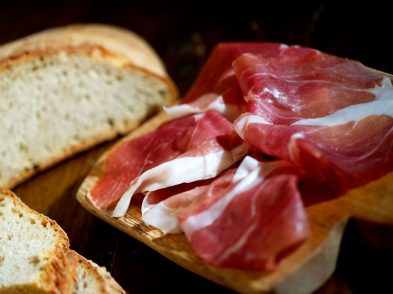Spring solstice has just arrived, which corresponds with Persian New Year, celebrated by more than ten countries from the “-stans” (Afghanistan, Turkmenistan, etc.) to Albania and by several ethnic groups not just in Iran by Iranians. Italy is home to several international communities, including a modest Iranian population of over 12,000, according to the country’s office for statistics, ISTAT. While commanding a relatively small population, Iranians are extremely active and well integrated into Italian society as artists, engineers, medical professionals, students and entrepreneurs.
Florence has long been home to a high concentration of Iranians (nearly 700 registered in Florence and just over a thousand in Tuscany), although Rome and Milan has the largest in terms of numbers. The impact of Florence’s Iranian community is further evidenced by Middle East Now, an annual film festival and tribute to Middle Eastern culture and awareness of the various issues the region faces as a whole. Mark your diaries: this year’s Middle East Now is scheduled to return to Cinema La Compagnia September 28 through October 3.
For many (especially me), the gateway to exploring curiosity for a new culture is through its food. Let’s dust off this last trying year and dive into this new century with renewed life!
Here are some ideas to celebrate spring while continuing to learn about Persian culture year round with these food businesses in Florence, Tuscany and Italy at large.
For the store cupboard: pomegranate molasses + more

Advie food store off piazza Beccaria
If you’re looking to stock up on Persian ingredients and try your hand at some dishes (herbed frittata kuku sabzi is one of the easier dishes to start for Persian food beginners, as long as you have patience for cleaning fresh herbs), head to Advie off piazza Beccaria. They stock a dizzying array of imported dried spices, including essentials like dried limes for beloved classics like ghormeh sabzi (stew of kidney beans, lamb shank, dried lime and fresh herbs); luscious dates, which are dessert on their own, from Bam, a region hard hit by a devastating earthquake in 2003; Persian tea, hookah tools; and other staples like Iranian pistachios, barberries, rose water and pomegranate molasses.
Via Fra Giovanni Angelico 53B, Florence / FB: @AdvieSpezieAlimentari / IG: @advie.fga
For Persian soul food in central Florence
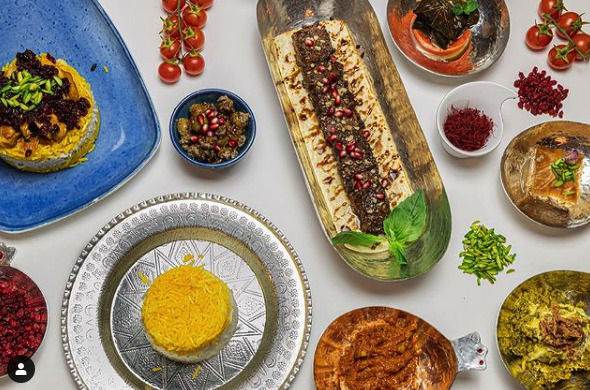
Opened in 2017, Ristorante Tehran is a soulful Persian food oasis independently run by Amir Aliyari and Panteha Novirioffer a varied menu of Persian food classics from succulent marinated kebabs (the pomegranate molasses and walnut marinated chicken or sirloin torsh kebab is sublime), stews like ghormeh sabzi, dizi mutton chickpea spiced abgoosht, saffron rice specialties such as tachin with barberries and chicken, almost like a cake and also common during the New Year period. Even in these color-coded times, Ristorante Tehran is open for delivery/takeaway. When they can re-open, this is a goosebump-inducing spot to dine in and feel as if you’re in a sincere eatery in Tehran, decked out in traditional ceramics, dim lighting and vintage photography of Iranian landscapes and city scenes. Make sure to partake in all the bells and whistles from the doogh yogurt drink aperitivo and finishing with Persian tea and honey-drenched sweets.
Via dei Cerchi, 25/R, Florence / www.ristorantepersianotehran.it / FB: @RistorantePersianoTEHRAN / IG: @ristorantetehran
For upscale Iranian cuisine in Florence

Aromatic dessert at La Congrega
Surely anyone who has been in Florence more than five minutes has passed by this hideaway wedged between Migone and Robiglio a stone’s throw from the Duomo on via dei Tosinghi. Historically the block served as a makeshift bunker for well-to-do aristocrats when protecting artistic treasures or themselves from invaders. Today La Congrega serves fine Persian dishes alongside traditional Tuscan fare by Iranian-Italian couple Mahyar Sanago Moghadam and Stefania Giani. The Persian offerings are few but concise, from an antipasto spread, including smoked eggplant dips, grilled meats, saffron rice and minced meat marinated kebabs. Currently available for take-out/delivery and an upscale choice for when dining-in returns.
Via dei Tosinghi, 3/4R, Florence / la-congrega.thefork.rest/en_GB / FB: @LaCongregaFirenze / IG: @lacongregafirenze
For an At Home Persian food experience

Persian Food Experience is an earnest venture organized by Cristina Bianciardi, a Sienese who spent a year living in Iran, falling in love with the culture (and an Iranian from the verdant northern province of Gilan, near the Caspian Sea) before teaching herself Iranian cuisine. Defining herself as “an aspiring chef in Persian cuisine”, she shares her journey through an “Eat With” dining experience in her home in non-pandemic times and has currently pivoted to weekly deliveries in Florence. Cristina thoughtfully designs weekly menus (starters, mains and dessert) according to season and has a limited number of meals, so book quickly by the Tuesday cut-off for Friday night deliveries.
FB: @persianfoodexperience / IG: @persian_foodexperience
For Iranian saffron online in Italy

Trento-based project Shirin Persia deserves a mention, even if it’s not in Tuscany. The inspiring start-up specializes in direct farmer fair-trade sourced saffron sold online throughout Italy and is recognized by Slow Food Italia. Powered by former mechanical engineer Ala Azakdia from Tehran, Shirin sells not only saffron, but also saffron accessories such as scarfs tinted from the petals and saffron-scented colomba: just in time for Italian Easter! Ala also partners with a local brewery to make saffron-infused craft beer from American hops, which Cristina Bianciardi (see above) sources for her food delivery and experiences. The beers pair delightfully with all the flavorful Persian herb-rich fare.
www.shirinpersia.com / IG: shirinpersia.it
On Nowruz
Persian New Year follows the foundations of the Jalali calendar, which is considered the most accurate in the world as it’s calculated down to the minute. This year is particularly important as it marks the change from 1399 to 1400 (at 10:37am CET to be precise in 2021), meaning a new century. Persians know how to celebrate: they take 13 days to kick off!
The eve is marked by assembling a haftsin, a sort of altar of seven symbolic items, which all start with “s” in Farsi (such as garlic seer, herb sprouts sabzi, apple sib, sumac, etc.) to bring prosperity, health and luck. The ritual is to gather at your haftsin the exact time of the New Year turn, which could be the last day of winter or the first day of spring depending on the year.
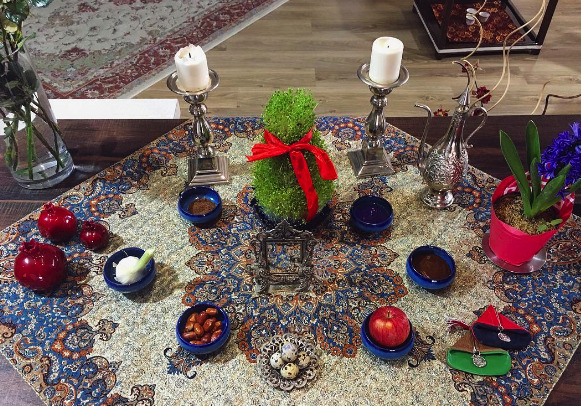
Haftsin ph. @curiousappetite
The first day of the New Year commences with a lingering lunch of fish (mahi) with preparation styles that vary according to the region (fried, herb, nut and molasses, stuffed, baked, etc.) and herbed rice and herbed frittata kuku sabzi as herbs signify new beginnings.
Throughout the 13 days, eyd didani visits to family homes are conducted where traditional Persian cookies and teas are consumed while chatting and sharing wishes for a prosperous new year and eidi new bills (you have to get from the bank!) are given by the elders to the younger members. On one New Year’s in the states, my family circulated $2 bills as they are rare and I never spent them, always holding on to them for luck. The New Year festivities end on the thirteenth day with a picnic, similar to the Pasquetta, or Easter Monday in Italy. If you live near a body of water, you picnic there and throw your sabzi (specifically, the herbs that have been at your haftsin for 13 days) into the river as a sign of purging and readiness for a clean slate. The last day of festivities of Nowruz 1400 is April 3, 2021.
Coral Sisk is an Iranian-Italian America-born food writer, blogger of Curious Appetite and sommelier from Seattle, WA and has called Florence home since 2012. Her blog details travel and calories of note in Florence and beyond, and her writing can be found on sites like Eater, Vogue and Conde Nast Traveler. In normal circumstances, she leads culinary wine tours in Florence, Bologna and around Tuscany, but her pandemic pivot involves gourmet gift boxes and virtual classes from Florence.
@curiousappetite on social media


